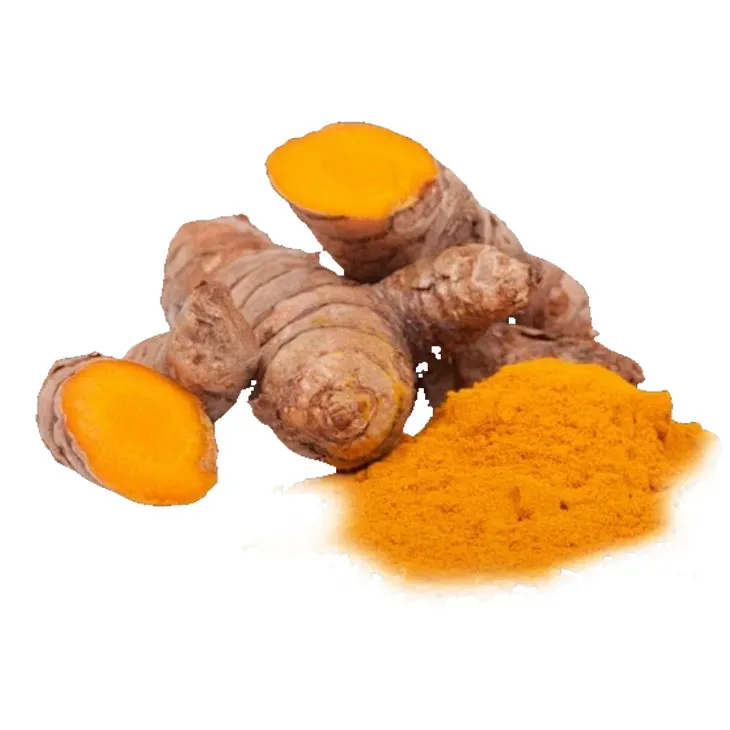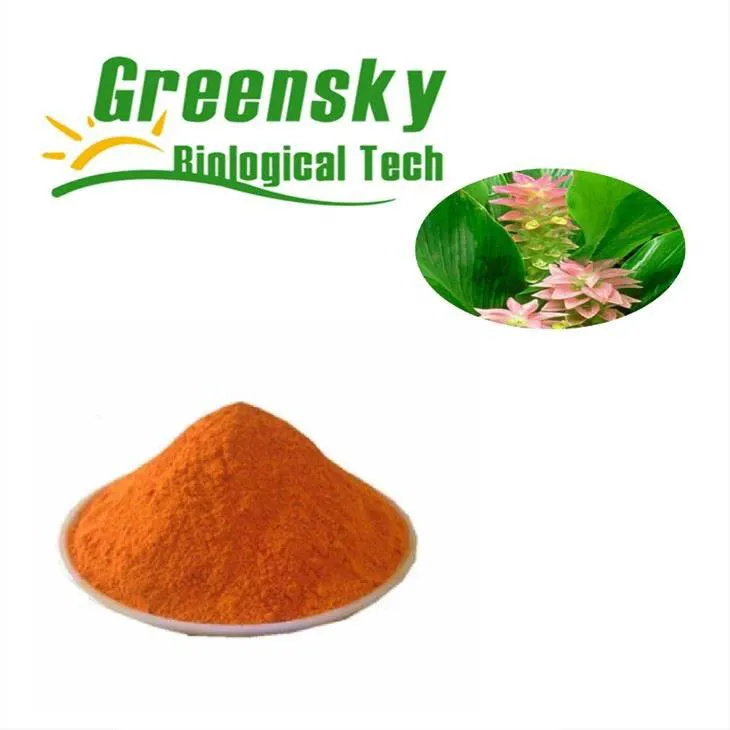- 0086-571-85302990
- sales@greenskybio.com
14 Major Health - care Efficacy of Curcumin.
2024-11-13

1. Introduction to Curcumin
Curcumin is a natural compound that is derived from the turmeric plant. It is what gives turmeric its characteristic yellow color. For centuries, turmeric has been used in traditional medicine, particularly in Ayurvedic and Chinese medicine. However, in recent years, Curcumin has attracted significant scientific attention due to its potential health - enhancing properties.

2. Antioxidant Properties
Antioxidant Function: Curcumin acts as a potent antioxidant. Free radicals are unstable molecules that can damage cells in the body, leading to various diseases and premature aging. Curcumin has the ability to neutralize these free radicals, protecting the body's cells from oxidative stress.
Comparative Advantage: Compared to other antioxidants, curcumin has a unique chemical structure that enables it to interact with a wide range of free radical species. This broad - spectrum antioxidant activity makes it a valuable addition to the body's defense against oxidative damage.

3. Anti - Inflammatory Effects
Inflammation and Disease: Chronic inflammation is associated with numerous diseases, including heart disease, diabetes, arthritis, and certain cancers. Curcumin has been shown to reduce inflammation in the body by inhibiting the production of inflammatory molecules such as cytokines and prostaglandins.
Mechanism of Action: It does this by interfering with the signaling pathways that lead to inflammation. For example, curcumin can block the activation of NF - κB, a transcription factor that plays a key role in the inflammatory response. By reducing inflammation, curcumin may help prevent or manage these inflammation - related diseases.

4. Digestive Health Benefits
Improving Digestion: Curcumin can stimulate the production of bile in the liver, which is essential for the digestion and absorption of fats. This can help improve overall digestive function, especially in people with problems digesting fatty foods.
Gut Health: It also has a positive impact on the gut microbiota. Studies have shown that curcumin can promote the growth of beneficial bacteria in the gut while suppressing the growth of harmful bacteria. A healthy gut microbiota is crucial for a strong immune system, proper digestion, and overall health.

5. Boosting the Immune System
Immune - enhancing Properties: Curcumin can enhance the function of the immune system in several ways. It can stimulate the production of immune cells such as macrophages and lymphocytes, which are responsible for fighting off infections.
Anti - microbial Activity: Additionally, curcumin has antimicrobial properties, which means it can help the body fight against bacteria, viruses, and fungi. This dual - action of enhancing immune cell function and directly combating pathogens makes curcumin a valuable asset in maintaining a healthy immune system.

6. Benefits for Skin Health
Skin Aging: Curcumin can protect the skin from the harmful effects of UV radiation, which is a major cause of skin aging. It does this by neutralizing the free radicals generated by UV exposure and reducing inflammation in the skin.
Skin Conditions: It may also be beneficial for treating various skin conditions such as acne, psoriasis, and eczema. Curcumin's anti - inflammatory and antioxidant properties can help reduce redness, swelling, and itching associated with these conditions.
7. Cardiovascular Health
Heart Disease Prevention: Curcumin can help prevent heart disease in several ways. It can reduce inflammation in the blood vessels, which is a major risk factor for atherosclerosis (hardening of the arteries).
Lowering Cholesterol: It may also help lower cholesterol levels by increasing the excretion of cholesterol from the body. Additionally, curcumin can improve the function of the endothelium, the inner lining of blood vessels, which is important for maintaining normal blood flow and blood pressure.
8. Anti - Cancer Potential
Cancer Prevention: Curcumin has shown potential in preventing cancer. It can inhibit the growth of cancer cells by interfering with various cellular processes such as cell division, apoptosis (programmed cell death), and angiogenesis (the formation of new blood vessels that supply tumors).
Complementary Treatment: While curcumin is not a substitute for conventional cancer treatments such as chemotherapy and radiation, it may be used as a complementary therapy to enhance the effectiveness of these treatments and reduce their side effects.
9. Neurological Benefits
Brain Health: Curcumin can cross the blood - brain barrier, which makes it a potential candidate for treating neurological disorders. It has been shown to have neuroprotective effects, protecting the brain cells from damage caused by oxidative stress and inflammation.
Alzheimer's and Parkinson's Disease: Studies have suggested that curcumin may be beneficial in the prevention and treatment of Alzheimer's and Parkinson's diseases. It can reduce the accumulation of amyloid - beta plaques in the brain, which are characteristic of Alzheimer's disease, and protect dopaminergic neurons in the case of Parkinson's disease.
10. Anti - Diabetic Effects
Diabetes Management: Curcumin can help manage diabetes in several ways. It can improve insulin sensitivity, which means that the body's cells can better respond to insulin and take up glucose from the blood.
Reducing Blood Sugar Levels: It may also directly reduce blood sugar levels by inhibiting the breakdown of carbohydrates in the gut and increasing the uptake of glucose by the liver and muscles. Additionally, curcumin can reduce the inflammation associated with diabetes, which can further improve the management of the disease.
11. Joint Health
Arthritis Relief: Curcumin has been used for centuries to relieve joint pain and inflammation associated with arthritis. Its anti - inflammatory properties can reduce swelling, stiffness, and pain in the joints.
Cartilage Protection: It may also help protect the cartilage in the joints by inhibiting the enzymes that break down cartilage. This can slow down the progression of arthritis and improve joint function over time.
12. Liver Health
Detoxification: The liver is the body's major detoxifying organ, and curcumin can support liver health by enhancing its detoxification processes. It can increase the activity of liver enzymes that are involved in the metabolism and elimination of toxins from the body.
Liver Disease Prevention: Curcumin may also help prevent liver diseases such as fatty liver disease, hepatitis, and cirrhosis. It can reduce inflammation in the liver and protect liver cells from damage caused by toxins and oxidative stress.
13. Respiratory Health
Anti - Inflammatory in Lungs: Curcumin can reduce inflammation in the lungs, which is beneficial for people with respiratory conditions such as asthma, chronic obstructive pulmonary disease (COPD), and bronchitis.
Antimicrobial in Respiratory Tract: It also has antimicrobial properties in the respiratory tract, which can help fight against respiratory infections caused by bacteria, viruses, and fungi.
14. Anti - Aging Effects
Cellular Aging: Curcumin can slow down cellular aging by reducing oxidative stress and inflammation at the cellular level. This can help maintain the function of cells and tissues over time.
Overall Longevity: By protecting the body from various diseases and maintaining the health of different organ systems, curcumin may contribute to overall longevity. However, more research is needed to fully understand its role in extending lifespan.
15. Conclusion
Curcumin is a remarkable compound with a wide range of potential health - care benefits. From its antioxidant and anti - inflammatory properties to its effects on various organ systems, it offers a multi - faceted approach to health maintenance. While more research is still needed to fully understand and harness its potential, incorporating curcumin - rich foods such as turmeric into the diet or taking curcumin supplements may be a beneficial step towards improving overall health.
FAQ:
What are the antioxidant mechanisms of curcumin?
Curcumin acts as an antioxidant by donating hydrogen atoms to free radicals, thereby neutralizing them. It can also chelate metal ions that are involved in the generation of free radicals, preventing the initiation of oxidative reactions in the body.
How does curcumin reduce inflammation?
Curcumin can inhibit the activity of various inflammatory mediators such as cytokines and enzymes like cyclooxygenase - 2 (COX - 2). It also modulates the signaling pathways involved in the inflammatory response, ultimately reducing the overall inflammation in the body.
What specific benefits does curcumin offer for digestive health?
Curcumin can help improve digestion by promoting the production of bile. It also has anti - microbial properties in the gut, which can help maintain a healthy balance of gut microbiota. Additionally, it may reduce symptoms of digestive disorders such as indigestion and bloating.
How does curcumin contribute to skin health?
Curcumin has anti - inflammatory and antioxidant properties that are beneficial for the skin. It can help reduce skin inflammation, which is associated with conditions like acne and psoriasis. It also protects the skin from oxidative damage caused by UV rays and environmental pollutants, potentially slowing down the aging process of the skin.
How does curcumin boost the immune system?
Curcumin can enhance the function of immune cells such as macrophages and lymphocytes. It modulates the immune response by regulating the production of cytokines, which are important signaling molecules in the immune system. This helps the body to better defend against pathogens.
Related literature
- The Anti - Inflammatory Effects of Curcumin in Health and Disease"
- "Curcumin and Digestive Health: A Review of the Evidence"
- "The Role of Curcumin in Skin Health and Disease"
- "Curcumin: A Potent Immunomodulatory Agent"
- ▶ Hesperidin
- ▶ Citrus Bioflavonoids
- ▶ Plant Extract
- ▶ lycopene
- ▶ Diosmin
- ▶ Grape seed extract
- ▶ Sea buckthorn Juice Powder
- ▶ Fruit Juice Powder
- ▶ Hops Extract
- ▶ Artichoke Extract
- ▶ Mushroom extract
- ▶ Astaxanthin
- ▶ Green Tea Extract
- ▶ Curcumin
- ▶ Horse Chestnut Extract
- ▶ Other Product
- ▶ Boswellia Serrata Extract
- ▶ Resveratrol
- ▶ Marigold Extract
- ▶ Grape Leaf Extract
- ▶ New Product
- ▶ Aminolevulinic acid
- ▶ Cranberry Extract
- ▶ Red Yeast Rice
- ▶ Red Wine Extract
-
Pueraria Lobata Extract
2024-11-13
-
Cactus Extract
2024-11-13
-
Red Wine Extract
2024-11-13
-
Oat Straw Extract Powder
2024-11-13
-
Nutmeg Extract
2024-11-13
-
Lavender Extract
2024-11-13
-
Sugarcane Extract
2024-11-13
-
Calendula Extract
2024-11-13
-
Beetroot Powder
2024-11-13
-
Fenugreek Extract Powder
2024-11-13





















